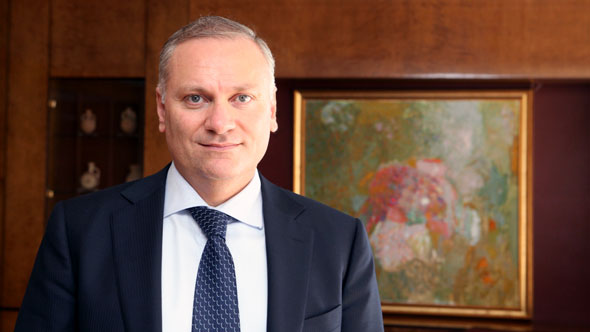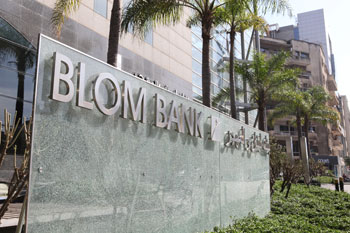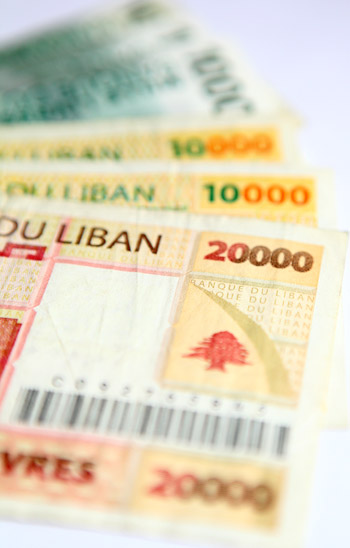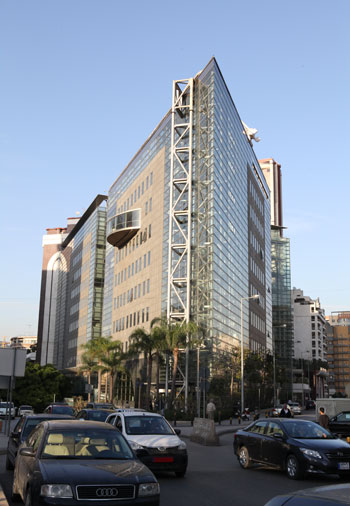“Lebanese Banking Sector is Extremely Liquid,” says Blom Bank
Despite the regional situation, banking sector in Lebanon performed well in 2011. 2012 started off very well for the banking sector in Lebanon; the banks are growing, says Mr. Azhari. Blom Bank enjoys the best return on equity, the best return on asset, the lowest cost to income etc. Blom Bank has recently received an award Best Bank in Lebanon for 2012.
Interview with Saad Azhari, Chairman and GM of Blom Bank

Banking activity weathered softer economic conditions and heightened developments in the region, while profits lulled due to higher provisions and pressured margins on declining asset yields; liquidity and capitalization levels continued to remain healthy, supporting the Lebanese banking system while asset quality deteriorated marginally on account of regional operations. In 2011, top 3 Lebanese banks managed to report decent balance sheet activity as highlighted by a respective 2.5%, 2.1% and 4.5% increase in assets, deposits and loans, despite a slowdown in the local economy and the political turmoil that impacted the MENA region and slowed capital flows into Lebanon. What is your overall assessment of the banking sector in Lebanon?
For sure 2011 was not an easy year. First of all, at the beginning of the year, for the first half of the year we didn’t have a government, so there was a political tension, and we had also important political developments in the region, especially in the second half of 2011 with the events in Syria, and Lebanon gets affected by the events of Syria because of our border. Lebanon has a strong relationship with Syria and also our import/export goes through Syria to the Gulf and other Arab countries. Lebanon was affected, thus recording the GDP growth of only one and a half percent in 2011, much lower than in 2010. However, we have witnessed zero growth in the first half of 2011 and almost 3% growth in the second half.
So far, in the first half of 2012 the GDP is growing at around 3% and hopefully if things improve we can have a higher growth rate.
The Lebanese banking sector performed reasonably well compared to the situation in the region. As you mentioned, there was an increase of provisioning as a measure to offset the exposure in Syria, because the Lebanese banks have loans granted to Syrian customers.
And because a lot of banks in Lebanon have subsidiaries in Syria or control banks in Syria, the banks reported higher provisions. Despite these measures and the drop in deposits and slower lending in Syria, Lebanese banks managed to grow. Banks in Lebanon recorded a growth in deposits and lending and our profits were relatively stable, so the effect was that we did not enjoy the growth rates of 2010 but recorded growth nonetheless.
2012 started well for the banking sector in Lebanon. The banks are witnessing growth, if you compare March 2012 to March 2011 deposits grew by about 10% and lending in Lebanese banks grew by about 13%. Overall, the situation in the banking sector in improving.
The reserves of the Central Bank of Lebanon are at historic peaks, up to more than 30 billion (not including gold reserves), and the Central Bank is intervening in the market, effectively buying dollars because there is demand for the Lebanese pound so the situation in the Lebanese banking sector is relatively strong.
What is the outlook on non-performing loans? Asset quality, loan portfolios, etc.?
The Lebanese banking sector witnessed in 2011 a slight increase in non-performing loans, but we are speaking about maybe a one percent increase, but if you look at the last 4 or 5 years, non-performing loans went down from about 8% to about 2.9% and now up to around 3.7%, so in general there was a big drop until 2011 but with a slight increase of about 1% in 2011.
Blom Bank enjoys the best return on equity, the best return on asset, the lowest cost structure, the lowest cost to income, so we have the best performance. Not only this year, but also in the last 8 years.
Because banks in Lebanon have some exposure to Syrian customers it’s natural when the situation in Syria was deteriorating that there’s some type of delays in loans, that’s why non-performing went up, but provisioning even went higher, because we have taken provisions on a collective basis not only as specific provisions.
Most of the non-performing loans are because of the delays but we are seeing, you know, good payments; and as I told you, all banks are seeing that their balance sheets or their exposure on Syria is coming down very fast because people are repaying their loans.
I think that we are going to see a slight increase in non-performing loans, maybe again in 2012 and then things will probably start to improve.
The 3 main banks (Bank Audi, Blom Bank and Byblos Bank) listed on the stock market have published the results of the first quarter and all 3 have witnessed a slight increase in profits in the first quarter of 2012, but all of us have taken also important provisioning; despite these provisionings we’ve managed to have a slight increase of profits.
Now what is your opinion about interest rates? Are they going to remain stable? Or are they going to copy what is happening in the States, they will keep their rates down?
You know in Lebanon, two third of the banks’ balance sheet is in dollars and one third in Lebanese pounds, so if you are speaking about the interest rates on the dollar’s side, the cost of deposits for the dollars in Lebanon is higher than outside, higher than in the US.
We are seeing rate stability now, with the average rate paid in Lebanon at around 2% higher than labor, depending on the bank, with rate paid is between 2.5 and 2.8% on dollar deposits. Also, on the Lebanese pound’s side, we have seen relative stability at around 5.5, 5.6%, with a resulting stability in deposits. If there is a major rise in rates in the US then probably there would be some reflection here.
What do you think are the major challenges for the sector?
The Lebanese banking sector is extremely liquid, I mean, you know, we have deposits right now, at the end of March, of around 117 billion US dollars, loans to the private sector of around 41 billion. So if you look at the loans over deposits ratio it´s very small compared to most of the countries in the world, perhaps the lowest ratio of loans over deposits.
The banking sector is also in a way supporting the government because it buys Government’s Treasury Bills and Euro bonds etc. If you include the exposure to the government – accounting for over 28 billion – and the loans to the private sector, still there´s a lot of liquidity. With the rest the banks buy international bonds or have deposits in the Central Bank.
The banking sector is very liquid and that is the reason that makes the Lebanese banks very resilient. Even with the economic woes, the liquidity means that the banking system would operate normally, even under extreme economic conditions. And banks will continue lending because of the high levels of liquidity.
The downside of liquidity is the impact on profitability.
But with Lebanese banks having a return on equity between 15 to 20% over the last years, and compared to the returns we see in Europe and the US, I think the banking sector in Lebanon is well off.
The returns are reasonable. And among the main banks that are listed on the stock market, Blom Bank has the highest return on equity and highest return on assets.
You touched on the Blom Bank financial performance in terms of the key financial ratios, justly, how do you assess your performance and what is the outlook for Blom Bank in this regard? Are you bullish, is Blom Bank going to out-perform other banks in Lebanon?
As I partly mentioned above, among listed banks, Blom Bank enjoys the best return on equity, the best return on asset, the lowest cost structure, the lowest cost to income, so we have the best performance. Not only this year, but also in the last 8 years.
Blom Bank is doing well in the region, even with the events in Syria. Blom Bank is taking a lot of provisions and the loan portfolio in Syria is now 44% where it was at the beginning of 2011,and the deposit level is also 40% from where it was at the beginning of 2011.
In Syria, we had 1.8 billion US dollars of deposits at the beginning of 2011, we are today around 800 million US dollars of deposits. For loans, Blom Bank went from 660 million in loans to 260 million in 2011.
Despite the downsides we have managed to remain profitable in 2011; and in 2012 we are taking a lot of collective provisions. In Egypt in 2011 we had an increase of about 40% of Blom Bank profits, increase of our deposits; and this year also started well, so even though the environment in Egypt is not that easy we are managing pretty well.
In Jordan Blom Bank is still growing despite the complicated working environment. Blom Bank Jordan is growing in deposits, lending and profits. So really Blom Bank is performing even in markets that are a bit difficult.
The group is spread in 12 countries, and we think that the future is good and we think that even in countries that due to this environment are now not doing that well, I think in the medium/long term things will definitely improve again.
The solid growth in operating income came mainly on the back of important gains in trading and investment operations to USD 68.5 million in Q1/12 up by roughly 200% from USD 22.6 million in Q1/11, whereas net interest income was almost flat (+1%) and fees and commissions income was slightly lower (-5%). Is this the beginning of a new trend due to Blom Bank’s new presence in Saudi Arabia?
Traditionally, Blom Bank was mostly in trade finance activity, and gradually over time we have become a full service bank and we are strengthening all types of operations. So now if you look at the strongest growth, where we have it actually is in asset management, in fund management, and as you mentioned in Saudi Arabia.
Blom Bank launched 6 months ago a fund in Saudi Arabia to invest in the local stock market. It is the second best performing fund in Saudi Arabia even though people are saying we are new to the market, but we have been able – with our systematic, proper way – to manage the fund conservatively, choosing the stocks based on fundamentals not based on rumors, and as a result managed to really run the funds profitably.
Blom Bank has mutual funds in all surrounding countries such as Lebanon, Egypt, Jordan. We also have a bonds fund and money market funds. During the past 2 years this area has been rapidly developing, the asset management business in growing strongly.
We have now an Islamic bank, Blom Development Bank, and we plan to try to grow its products in the Gulf, Egypt. We have also established a fund which is equity based for a real estate project; and, at the same time, we provided the loan funding for it. It was the first time where a bank, an investment bank, provided both the equity and the debt, so we effectively arranged everything. Investment banking is growing for us and Blom Bank wants or has become a full service bank.
How much of Blom Bank’s operation derives from investment banking? How much of your return derives from investment banking?
Investment banking and asset management are in their infancy. The new business lines such as brokerage, investment management, asset management are growing fast, but still the traditional activity represents around 70% of our income (though the 30% is growing at a fast pace).
The retail side has been growing very fast also, and effectively in Lebanon around 40% of our lending now is retail. We are number one in car loans and housing loans and retail activity is now very strong and growing.
Everything is improving, but the highest growth rate we have is in asset management, investment banking, followed by retail. Blom Bank’s commercial lending is growing too; so in effect all sectors are growing, in addition to our insurance arm which is also doing pretty well in Lebanon and in the region.
Aren´t you afraid of over-diversifying in fields where you are new? How does Blom Bank manage the risk?
For us it´s a continuation of our activity, it´s all banking activity, banking plus banking insurance. The important thing is to do it in a conservative way.
What are your frustrations and challenges? What would you like to do differently?
The highest risk for us is the government itself. Our biggest customer for loans and for the banking sector in Lebanon is the public sector, and it´s very important for us that the government keeps control of its finances and that they manage their debt and their deficit, this is very important. Having said that, I have to add that in the last 5 or 6 years the economy grew at a much faster pace than the debt.
The level of debt over GDP went down from 180% to 130% or lower, so it´s the opposite of what we see in the world in the last few years. In Lebanon the debt over GDP ratio is improving, but we still have a very high level of debt and we still have an sizable deficit and it´s very important that the government keeps control over it and we continue to lower it.
I have to say that the actual and previous Prime Ministers and Ministers of Finance are all aware of that and they always say that they will not increase spending without increasing income. So we are OK, but this is something that we always want to make sure is under control.
What do you expect from the important new regulations that are now being implemented, the circular 126/2012 by the Central Bank, also Washington’s foreign account tax, combined anti-laundering laws, so with all these ingredients what do you expect?
Because of our links to the outside and because a lot of our customers trade with the outside world, and they deal with dollars and the Euros, we are very much aware of everything that is happening outside. And we are up to date and we apply all regulations that can affect our correspondence. We also want to be always compliant with all regulations, for example Basel 3, where we are going to be compliant before the banks abroad and at a higher ratio, since the Central Bank of Lebanon required us to arrive at capital adequacy of 12% in 2015.
As a loan bank, Blom Bank is already at 13%, higher than what is required of banks outside. The banks outside are allowed to arrive at Basel 3 in 2018, but as I said Lebanese banks will accomplish that in 2015 and at a higher ratio, so we are always not only compliant but compliant before a lot of banking sectors abroad.
The US FATCA legislation wants to make sure that American citizens and residents don´t escape from the taxation that they have to pay, the law applies all over the world. The application of this legislation will be easier in Lebanon because we do not have as many Americans residents and reporting will thus not be complicated.
The adoption of best practices and regulations do improve the reputation of the banking sector in Lebanon. Is the reputation important?
I think the reputation of the sector has always been important. The Association of Banks in Lebanon worked on the code of diligence of banks for the past 20 or 30 years. Also, Lebanese banks have signed multiple agreements on what type of transparency and information that they have to publish and that are legally transparent.
The banking sector and banks in general have always sought ways to be up to date with international regulations and to be as open and transparent. However, this does not mean that banking secrecy is endangered, since banking secrecy does not mean that people escaping from jurisdictions could park their cash in Lebanon and get away with it. Lebanon wants to be a place where clean money is deposited.
Actually, 83-84% of deposits in Lebanese banks are from the Lebanese residents and 16-17% are from non-residents (a big portion of those numbers are from Lebanese who are living abroad). In fact, Lebanon is not a major financial center. We hope that in the future Lebanon will once again reclaim the financial center status.
Is it because of the crisis?
It´s because of the crisis and because of the wars that Lebanon has passed through and because of higher perception of instability.
It´s only the Lebanese who are residing inside or outside the country who feel confident about the future of the country but we don´t see hot money coming to Lebanon. This is in a way a strength in Lebanon since if it´s hot money depositors can get scared very fast. That is why at times like when we had the invasion from Israel (or you know the war in 2006) we had little out-flows because people here are confident.
If we´d had a lot of foreign money then you would have had maybe a sector that lost 10 or 15% of its deposits, but we didn´t see that because it was local money.
The money´s not flowing through centers such as Dubai from your perception?
If you look today where the big money is parked it is in Switzerland and some Asian countries. In the region, you have definitely Dubai and, to certain extent, Bahrain; but due to events in the latter, Dubai is becoming more important.
Finally, share with us the vision for Blom Bank?
You always got to have a strong competition, because without competition you don´t have incentives to do things better. Effectively there are more than 60 banks in Lebanon, which makes competition rather intense. The top 10 banks control an important share of the market and there is also strong competition among them.
Whenever Lebanese banks go abroad, especially in other Arab countries, we are able to penetrate strongly in the markets. I´ll just give you an example, we went to Jordan 5 years ago and within a couple of years we became the leader in retail and car loans even though there were a lot of banks, local and foreign. The same thing happened in Egypt, Syria.
The Lebanese banks have the know-how and they have always competed against other banks. The Lebanese market has never been protected from domestic and foreign competition, whereas lots of markets around us were protected and remain so. The Lebanese banks are spreading, they have the know-how, they have the systems and they can penetrate very fast the regional markets.